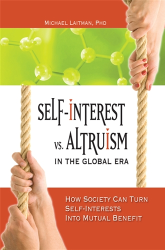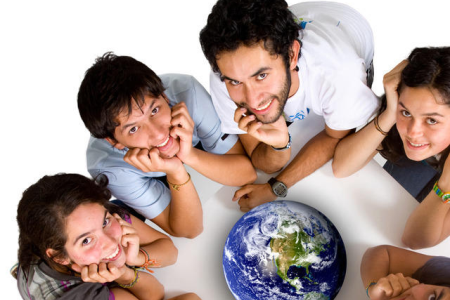Connection: Is Humanity Aware of Its Ties or Not?
Unlike all other elements in Nature, human beings have the power to change the environment. This gives us something that no other creature has: freedom of choice. Put differently, human beings can choose to be like the Creator—giving—and acquire the power and cognizance that come with it, by adopting the law of yielding self-interest before the interest of the environment. Or they can remain as they were born—self-centered, with limited understanding of Nature, and paying the price for their errant ways throughout history. But to choose to be like the Creator, which is synonymous with Nature, people must know what the term, “Creator,” means and how they can become like it.
The whole of reality consists of a single, broken entity, called “Adam’s broken soul” or “the broken soul,” and that the term, “soul,” refers to a desire to receive with an intention to bestow. When Kabbalists say that something is broken, they are not referring to any physical shattering, but to the tearing of the links between all parts of the soul, the collective desire that constitutes our reality. This tearing occurs when the pieces in the soul begin to operate in their own interest rather than in the interest of the system. It is as if cells in an organism begin to operate for themselves, causing the organism to die and disintegrate.
Yet, unlike organisms, the soul cannot disintegrate because it is a single desire. So while the links are there, we can enjoy the benefits of the connection. Healthy cells benefit from each other in an organism, supporting each other’s existence, but cancer cells compete with each other for blood and nourishment, thus constantly harming each other. In the case of humanity, we are not even aware that we are connected, which prevents us from trying to connect in the right manner.
How Good and Bad Behavior Spread Like Viruses
But regardless of our awareness, we are very much connected. On September 10, 2009, The New York Times published a story titled, “Are Your friends Making You Fat?” by Clive Thompson. In his story, Thompson describes a fascinating experiment performed in Framingham, Massachusetts. In the experiment, certain details of the lives of some 15,000 people were documented and registered periodically over more than fifty years. This allowed researchers Dr. Nicholas Christakis, a medical doctor and sociologist at Harvard, and James Fowler, at the time a Harvard political science graduate student, to create a map of interconnections and examine the long-term impact that people had on one another.
Christakis and Fowler established that there was a network of interrelations among more than 5,000 of the participants. Christakis and Fowler discovered that in the network, people affected each other and were affected by each other. These effects seemed to work not just in social issues, but surprisingly, with physical issues, as well.
“By analyzing the Framingham data,” Thompson wrote, “Christakis and Fowler say they have for the first time found some solid basis for a potentially powerful theory in epidemiology: that good behaviors—like quitting smoking or staying slender or being happy—pass from friend to friend almost as if they were contagious viruses. The Framingham participants, the data suggested, influenced one another’s health just by socializing. And the same was true of bad behaviors—clusters of friends appeared to ‘infect’ each other with obesity, unhappiness, and smoking. Staying healthy isn’t just a matter of your genes and your diet, it seems. Good health is also a product, in part, of your sheer proximity to other healthy people.”
Even more surprising was the researchers’ discovery that these infections could “jump” across connections. They explained that people could affect each other even if they did not know each other. Moreover, Christakis and Fowler found evidence of these effects even three degrees apart (friend of a friend of a friend). In Thompson’s words, “When a Framingham resident became obese, his or her friends were 57 percent more likely to become obese, too. Even more astonishing… it appeared to skip links. A Framingham resident was roughly 20 percent more likely to become obese if the friend of a friend became obese—even if the connecting friend didn’t put on a single pound. Indeed, a person’s risk of obesity went up about 10 percent even if a friend of a friend of a friend gained weight.”
As Christakis and Fowler described in Connected: The Surprising Power of Our Social Networks and How They Shape Our Lives, their book on their findings: “You may not know him personally, but your friend’s husband’s co-worker can make you fat. And your sister’s friend’s boyfriend can make you thin.”
Quoting Christakis, Thompson wrote, “In some sense we can begin to understand human emotions like happiness the way we might study the stampeding of buffalo. You don’t ask an individual buffalo, ‘Why are you running to the left?’ The answer is that the whole herd is running to the left.”
Warning: Denial of Your Interconnection and Interdependence Leads to Crisis
Similarly, in his essay, “The Freedom,” Baal HaSulam writes, “He who strives to continually choose a better environment is worthy of praise and reward. But here, too, it is not because of his good thoughts and deeds, which come to him without his choice, but because of his effort to acquire a good environment, which brings him these good thoughts and deeds.”
Thus, while the links themselves exist, as the above study demonstrates, our self-centeredness prevents us from being aware of them. “Christakis and Fowler’s strangest finding,” writes Thompson, “is the idea that a behavior can skip links—spreading to a friend of a friend without affecting the person who connects them. If the people in the middle of a chain are somehow passing along a social contagion, it doesn’t make sense, on the face of it, that they wouldn’t be affected, too. The two researchers say they don’t know for sure how the link-jumping works.”
Indeed, we act as if we are not connected, when we are actually very much so. Today, our interconnectedness has become interdependence; therefore, the gulf between reality and our incessant denial of it is posing a real threat. This is the real cause of the worldwide crises we have been experiencing.
 “Are You Aware of Just How Much Others Influence What You Feel, Think and Do? You Must Read This” is based on the book, Self Interest vs. Altruism in the Global Era: How Society Can Turn Self Interests into Mutual Benefit by Dr. Michael Laitman.
“Are You Aware of Just How Much Others Influence What You Feel, Think and Do? You Must Read This” is based on the book, Self Interest vs. Altruism in the Global Era: How Society Can Turn Self Interests into Mutual Benefit by Dr. Michael Laitman.






